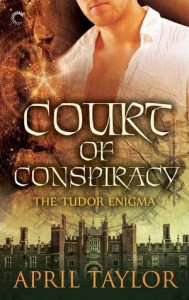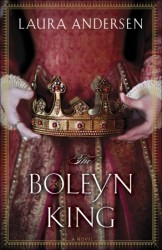 Format read: ebook provided by NetGalley
Format read: ebook provided by NetGalleyFormats available: ebook
Genre: Historical fantasy
Series: The Tudor Enigma, #1
Length: 254 pages
Publisher: Carina Press
Date Released: May 26, 2014
Purchasing Info: Author’s Website, Publisher’s Website, Goodreads, Amazon, Barnes & Noble, Kobo
England is the prize. The death of a young king is the price.
King Henry IX, son of Henry VIII and Anne Boleyn, holds the very balance of European power in his Protestant hands. His numerous Catholic enemies have cast greedy eyes upon his crown and will stop at nothing to usurp the throne.
An unassuming apothecary in the Outer Green of Hampton Court Palace is the Queen’s last hope.Luke Ballard treats the poor with balms and salves but is careful to protect his greater gifts. For Luke is also an elemancer, one of the blessed few able to harness elemental powers for good. His quiet life ends when Queen Anne commands him to hunt down the traitors, a mission he cannot refuse.
Beset on all sides, Luke mobilizes his arsenal of magic and ingenuity to conquer the enemy. But as the stakes are raised in the uneven battle of good vs. evil, he knows this is only the first skirmish of a lifelong war. The welfare of the Tudors—and England—depends on him alone.
My Review:
 Are the Tudors a thing now? I’m only asking because this is the second series to use the conceit that Anne Boleyn did not miscarry her son, and that Henry IX is now on the throne. (For the other take, see Laura Andersen’s Boleyn King, which I absolutely have to read).
Are the Tudors a thing now? I’m only asking because this is the second series to use the conceit that Anne Boleyn did not miscarry her son, and that Henry IX is now on the throne. (For the other take, see Laura Andersen’s Boleyn King, which I absolutely have to read).
In Court of Conspiracy, we have a 17-year-old Henry IX on the throne of England, with his very much living mother Anne Boleyn as one of his advisers. (If she had provided Henry VIII with a son, her head probably would have stayed on, instead of making her part of the old rhyme, “divorced, beheaded, died, divorced, beheaded, survived”)
The other difference between true history and April Taylor’s fascinating alternate version is that this particular alternative has magic. Or rather, there are people who practice elemental magic, both for good and for evil.
Historically, this was a time when people still burned witches, so anyone capable of practicing magic has to keep their talents hidden. Even Dowager Queen Anne Boleyn.
But just as occurred in our history, there are forces swirling around the throne who want to bring the young king down in order to gain or regain power, for themselves and for their particular religious beliefs.
Henry is Protestant, his older sister Mary is a staunch Catholic, and the younger Elizabeth follows the same teachings as her brother. There are plots and counter-plots boiling in every direction.
And into this mess the Queen coerces a young apothecary with elemental magic to investigate the plots against the King. She is all too afraid that the center of the plot is close to the Royal Household.
Luke Ballard is rightfully afraid that this investigation, not to mention merely meddling in the Royal Household, is going to get him killed. He’s very nearly right, on multiple occasions. There are too many people invested in murdering the King, and quite a few more simply greedy of their place and unwilling to let a relatively lowborn man move in their circles.
As his investigation continues, Luke discovers both allies and enemies in unlikely places; and that he is capable of much greater magic than his relative laziness has ever led him to contemplate.
He also uncovers an evil force that has been plotting against him for longer than he was aware, and that is willing to cut down his friends and companions in order to forward its evil intentions.
Escape Rating B+: I’ll say this up front, the Tudor period is one of my absolute favorites. In my teens, I read absolutely oodles of both historical fiction and history about this period. (Jean Plaidy of the many pseudonyms wrote awesome historical fiction in her day) So I was all for anything set in this time.
And this is the Tudors with magic! I’m all in.
Luke is a great point-of-view character. He’s young enough that he’s still making mistakes, but old enough to be an independent actor. And because he’s mostly on the outside of the Royal Court looking in, the author is able to give the reader lots of explanations.
Also, he’s just a likable human being who is stuck with a huge task.
The period details feel real, and well grounded in the history. It’s easy to get swept along the story, because you can almost smell the herbs as you follow Luke in his investigation and his daily tasks. The terrible realities of life as a small-time merchant, and how much the lower classes lived (and died) by the whim of the upper is not glossed over. In fact, it’s crucial to the plot.
It helps that the magic is mostly small and practical, not big and showy. It’s a matter of brain and will, but not so much firepower. Which makes this alternate 16th century easier to accept. It is possible that people had talent and concealed it.
This is also a good vs. evil story, for certain select values of good. (Evil is definitely evil). The evil powers want to upset the natural balance, and create chaos, by killing the King. This doesn’t mean that the King, the Queen or any of those currently in power are good by our definition, but they are the natural order.
While I’m glad that there was no romance between Luke and either of the women in the story, I’m not sure about the way that possible romance was used to introduce the all-too-obvious villain. The character of Luke’s would-be apprentice was too easily influenced.
Still, I enjoyed this conspiracy/investigation/magical history a lot. It reminded me of Candace Robb’s Apothecary Rose and Jeri Westerson’s Crispin Guest series, both favorites.
